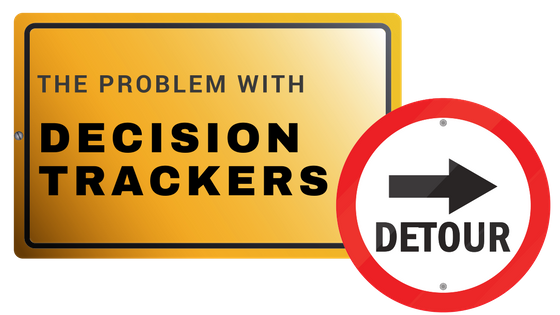
“Decision Logs” are just spreadsheets in disguise.
In the world of technology and instant communication, decisions are made in an infinite number of environments, and that’s okay! There’s no reason you can’t scale your decision making to the appropriate medium. You might make small decisions in a private chat message with a client, but need to propose larger changes in a meeting with stakeholders and get verbal approval from everyone at the table. A decision log template might be an improvement over no decision record whatsoever, but you shouldn’t have to settle for something that makes your job more difficult.
The problem with most decision logs is that they try to hijack the decision-making and communication processes that already work for your team. We all know that software fails when it tries to accomplish too much. Slack is great for managing fast, casual conversations with your whole team and specific individuals. Why compete with that? It seems that the market is flooded with tools that bury an underdeveloped decision tracking tool with extra “features” that other softwares do better. Personally, I’d much rather have three tools that each provide a great experience for their primary functionality, than one tool that just barely does everything I need, but doesn’t do any one thing well.
We don’t need decision making templates.
In my conversations with other project managers, not one of them uses a decision tracker. They all (with a rather frustrated sigh) explained how they used a custom spreadsheet, adapted a free online decision making template, or shoehorned their process into a task management program that wasn’t really built to support what they were using it for. Ultimately, they’d also rather keep the tools they like using everyday. It’s just not worth giving them up for a single process: recording decisions. Because that’s what decision trackers should really be for: tracking decisions, not making them.
As project managers we don’t need to force a new communication tool down everyone’s throats. Some clients will always prefer email. Some clients will add you to their Slack team. Adapting to the preferred communication method of your stakeholders can ease a lot of frustrations throughout the project. What we do need is a way to consolidate the record of decisions made across those different means of communication.
Ultimately, it doesn’t matter how a decision comes to be made. Six months later, whether a decision was made in a Basecamp conversation or conference call won’t be pertinent-- except in locating that decision. Do you remember which meeting it was? If it was recorded in the “actionable items” section of the meeting minutes, are those searchable? Which email in that thread of 67 responses contains the final decision? Six months later, does everyone have the same recollection and understanding of what that decision means? Even if your decision tracker addresses those problems, it’s not going to be effective if nobody on your team is using it.
Memorist: A real tracker, not a template.
Memorist is the first decision tracker to break the habit of recreating static spreadsheets online or striving to take over your project management toolset. It combines the powerful search and filter options of a spreadsheet with complete access control and the accountability of the client being the one to click the “Approved” button. However, Memorist is built to step in after your decisions are made-- meaning you don’t have to give up your favorite communication tools.
